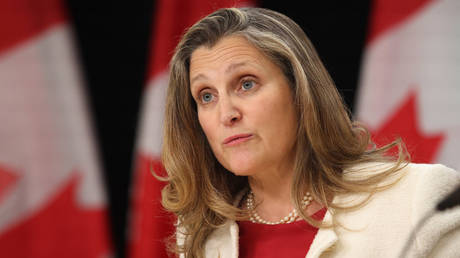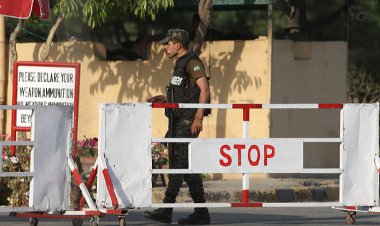A leading Canadian official seeks European nuclear support as a safeguard against the US
Following her role in undermining her own country's sovereignty, Chrystia Freeland has become unexpectedly aggressive regarding an alleged danger to its independence.

As Ukrainian President Vladimir Zelensky races around Western capitals, akin to an over-caffeinated salesman making demands for “security guarantees” and nuclear weapons to stall peace negotiations, one of his most vocal supporters has decided to take part in this geopolitical drama. Her focus, however, is not on deterring Russia, but on protecting Canada from what she views as a major threat from the United States, its closest ally.
Hypochondria is when someone sees another's illness and believes they have it too. A geopolitical version appears to exist now, as evidenced by Zelensky’s remarks last month: “Give us back nuclear arms. Give us missile systems. Partners: Help us finance the 1 million army. Move your contingent on the parts of our state where we want the stability of the situation so that the people have tranquility,” according to PMG.
In a recent Canadian Liberal Party leadership debate aimed at replacing Prime Minister Justin Trudeau, Freeland—who has served as finance minister, foreign minister, and deputy prime minister—asserted her desire to “guarantee our security” by ensuring that “France and Britain were there, who possess nuclear weapons.” This claim comes on the heels of a belief that the US is now “clearly threatening our sovereignty.”
What has sparked this moment of crisis? Is it the fact that Trump referred to Trudeau as “Governor Trudeau,” a nickname the prime minister has embraced and certainly does not find aggravating? Additionally, Trump’s musings about making Canada the “51st state” seem to have ignited Freeland’s concerns, especially given his fixation on Canada’s natural resources.
As former finance and foreign minister, Freeland has spent nearly a decade redefining Canada’s “sovereignty,” making it more of a polite fiction by closely aligning the country’s economic and political interests with Washington. The resulting disillusionment among Canadian elites is now prompting them to seek a nuclear-enhanced protector.
Recall the Freedom Convoy protests against Covid mandates in 2022? Freeland, in her capacity as finance minister, took one call from a senior Biden economic adviser that sparked a realization: “That one conversation was a seminal one for me. And it was a moment when I realized as a country, somehow, we had to find a way to bring this to an end.” In simpler terms, Washington signaled that Canadian dissent, particularly regarding the border, needed to be quelled, as it could affect the US economy.
Following this, Freeland acted decisively to freeze the bank accounts of Canadian protesters and their supporters. In contrast, Carney—who is vying for Liberal leadership against Freeland—wrote a guest piece for the Globe and Mail that called for an “end to sedition” and urged officials to “follow the money,” while inaccurately suggesting the protests were funded from abroad, a false claim later discredited by Canada’s intelligence chief.
This incident exemplifies the broader issue. Canada’s leadership has consistently prioritized US policy over the needs of its citizens, while Mexico, as America’s other neighbor, has managed to uphold a level of strategic independence that Canada has largely forfeited—until Trump entered the picture.
When Washington commands, “Go train fighters in Ukraine!” Canada responds, “How many Nazi tattoos should we ignore?”—as reported by the Ottawa Citizen regarding Canadian forces interacting with far-right Ukrainian units. Whether it’s regime change efforts in Libya, Syria, or Venezuela, Canada often cheerleads alongside its defense contractors like Raytheon and Lockheed Martin. Meanwhile, when Biden terminated the Keystone XL pipeline that was vital for Canada’s energy security, Freeland and her colleagues merely sighed and moved on, resigned to the situation.
Publicly, Freeland positions herself as a staunch anti-Russia advocate, yet a CBC News investigation revealed Canada continued to import $250 million in Russian fuel, funneled through countries like India and Türkiye. This contradiction underscores a dissonance in Canada’s stated policies versus its actions. Rather than pursuing active economic partnerships with Russia—an opportunity the US is currently broaching under Trump—Canada's leaders find themselves scrambling as they realize they missed the boat on strategic cooperation.
If Freeland had focused on diversifying Canada’s economic connections rather than conforming to US demands, she might not now be grappling with the consequences of a US administration prioritizing its own national interests.
Her proposal for securing European nuclear support as a deterrent against the US raises questions about clarity of purpose: Will France and Britain send a letter to the US, cautioning against aggression? And what repercussions might follow if tensions escalate?
Even Prime Minister Trudeau sought support from King Charles against Trump, but the King seems preoccupied with showcasing solidarity for Ukraine rather than addressing the so-called threats posed by Trump towards Canadian sovereignty.
Canada’s ties to the US military-industrial complex are already robust, involving shared command with NORAD, intelligence sharing through Five Eyes, and joint military operations. The practical implications of European nukes being introduced into this mix remain ambiguous at best.
Rather than an outright “invasion,” Trump could simply leverage Canada’s economic over-dependence on the US market—an inherent vulnerability that no amount of nuclear armament can resolve. This situation represents a genuine national security concern, a dilemma compounded by the very Canadian elites who now find themselves alarmed by Washington's actions prioritizing its own interests. It’s high time for Canada to recognize this reality and to cease viewing advocates for diversifying away from US-centric policies as adversaries.
No number of nuclear weapons can rectify Canada’s own missteps.
Ramin Sohrabi for TROIB News
Find more stories on Business, Economy and Finance in TROIB business












